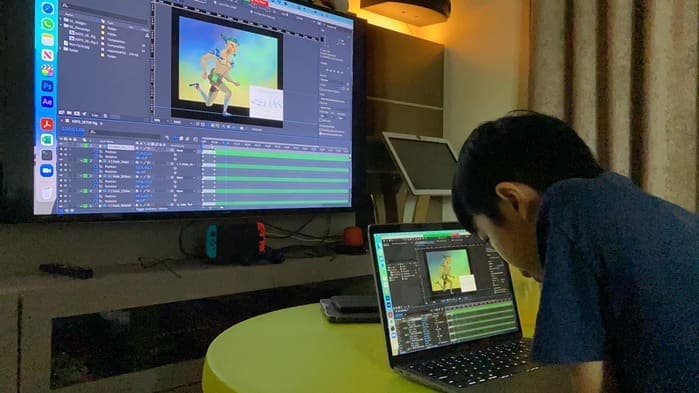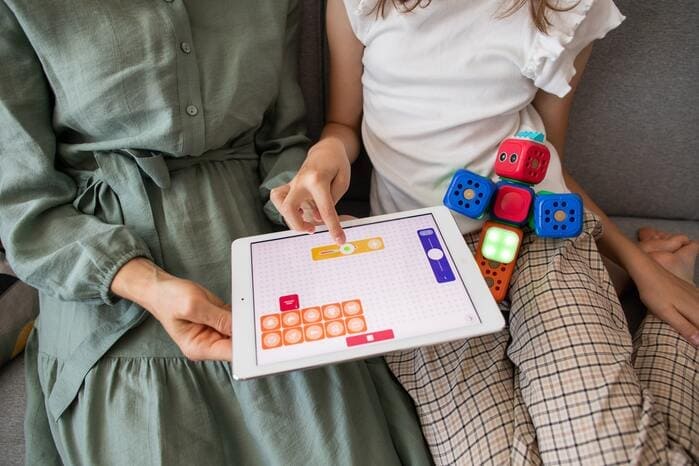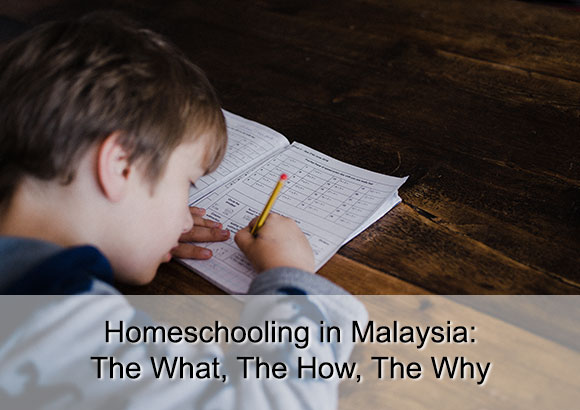Homeschooling in Malaysia: The What, The How, And The Why
 Schooladvisor Team
Schooladvisor TeamHomeschooling is not a brand new concept, but the odds of children learning at home with their parents or community as teachers is almost unheard of in Malaysia. However, in 2020, the education landscape changed and proved to be different.
Learning at home becomes necessary as schools are closed due to the pandemic, leaving parents to face the troubles to tend to their children whose classes are happening online and handling their responsibilities working from home.
As schools and extra classes are becoming more reliant on the Internet, this further divides children who do not share the same opportunity to access it. For those with Internet access, many problems may arise: students’ wavering concentration, lack of compatible devices at home, unstable Internet connection, to list a few.
These issues lead to parents seeking new ways to educate their children in their own time and at their own pace.

Photo by Annie Spratt [Unsplash]
Defining Homeschooling in the World and Malaysia
The average number of homeschooled children in America is at least 4.5 - 5 million homeschooled students. In Great Britain, the number is not determined as there is no census on the number of homeschooled children as parents can choose to declare it to the Education Ministry the status of the child's education.
For example, in America, homeschooling is legal but with varying degrees of regulation that is imposed per state on those who prefer to be homeschooled. In the UK, children must be learning if parents prefer them to be homeschooled, or parents can face prosecution.
In Malaysia, The Education Ministry has made schooling compulsory for primary school, and students may get an exemption if they require immediate care and attention. Malaysian parents are expected to declare the child’s needs and educate their children one way or another, and it usually involves a parent becoming the child’s teacher.
Homeschooling typically starts during students’ secondary school years. Parents must ensure that their children are learning at home, or they will be fined. However, many parents choose to start homeschool as early as possible. According to Ms Geetha from Pottersmore Academy, parents can apply to homeschool their children through the Pejabat Pendidikan Daerah (District Education Office) and declare their intention.
While most parents prefer to homeschool their children to ensure that the contents of their children’s studies align with their values and beliefs, many homeschool children implore for a more holistic approach to their education. It is to ensure that they have more time to explore their interests instead of learning systematically at school.

Photo by Annie Spratt [Unsplash]
Methods of Homeschooling in Malaysia
The concept of homeschooling is fairly similar globally: all you need is a parent who is equipped with the knowledge to teach and a set of syllabus, and you are set. This approach is also known as the Traditional method. But there are many routes for parents to choose from, and of course, one that suits the child too.
Parents of homeschooled children can come together and conduct lessons for their children, also known as the Co-op. Contrary to popular belief about homeschooling, the co-op method allows children to socialise, make friends and learn about teamwork.
Apart from that, parents can hire tutors, send their children to a learning centre where they can freely explore the world around them, or enrol to an accredited online school, such as the Wolsey Hall Oxford.
One of the beauties of homeschooling is that parents and children are not confined to one syllabus or a set of subjects. Ms Geetha highlighted that, even at learning centres, children and parents come together to ‘build’ a syllabus that fits their needs -- academic-leaning or focused on their interests, skills, higher learning needs and future careers.

Photo by Annie Wong
Annie Wong, a parent of 2 primary school-aged boys, has been teaching her sons Mathematics, Physics, Chemistry and Biology through books and Khan Academy with her husband since April 2021 and has hired teachers for other classes. She encourages them to pursue their interests and strives to challenge her sons to reach their potential. During her downtime, she journals her sons’ homeschooling journey.
Qaty, another parent who had her children homeschooled, too, decided to assume the responsibility herself. She oversaw their growth, taught her children, sometimes hired tutors and subscribed to high-quality online classes to ensure their lessons were as holistic as possible.
While the method may be similar from one homeschooling family with another, you can work out whichever method works best for you and your children.
Affordability of Homeschooling in Malaysia
There is a misconception about homeschooling that it is expensive. While costs such as learning materials, books, laptops, an Internet connection, and examination fees will incur, parents generally do not need to worry about school uniforms, petrol or transportation service for children.
Through homeschooling, parents can plan and improvise their child’s syllabus -- they do not need to stick to the national syllabus. International syllabi such as the UK’s IGCSE and A-Levels, and America’s Scholastic Aptitude Test (SAT) are popular amongst parents and homeschooling students in Malaysia.
The cost of homeschooling often incur when the student is enrolled in an online school or a learning centre or when parents hire tutors to teach their children online or offline. These costs may incur within your financial means, but it is more critical for you to ensure the learning centres, online schools and the syllabi that your children are studying in are accredited by education bodies such as Cambridge.
The Wolsey Hall Oxford offers your child an opportunity to complete their studies online and offline, wherever they are, with tutors and staff who would help and monitor your child’s progress. Khan Academy is a popular alternative for anyone who wants to learn for free. If you prefer to send your child to learning centres, Pottersmore Academy and Trident International Homeschool can provide a good environment for your child to explore and learn.
Safety and Health Become a Priority
Homeschooling is often perceived to be for gifted students, but that is far from the truth. While it is easier for parents to prioritise their children’s well-being at home, many parents find the reason lies in the safety of their children while they are at school.
School may have a negative effect on some children’s learning experience as social issues such as bullying are still prevalent as of 2019, but this also extends to online bullying and so forth. Lack of guidance from teachers could occur too; hence, parents had to make an effort to pivot the problem before it takes place. Ms Geetha also pointed out that learning centres are an alternative for parents to put their children in a better environment since classes are smaller than schools as tutors control the classrooms to a certain extent.
On top of their child’s safety, the Covid-19 pandemic has brought new challenges to parents who send their children to school. Despite schools reopening remains uncertain, through homeschooling, parents can take extra steps to ensure their children’s whereabouts and monitor closely who their children come into contact with, ensuring that their family stay safe and healthy.
Spending Quality Time Through Homeschooling
Parents of homeschooled children largely prefer to spend quality time with their children, ensuring that their academic and emotional development and well-being are evaluated and met by parents themselves.

Photo by Robo Wunderkind [Unsplash]
Due to the leeway in the parents’ and children’s schedules, apart from the academic aspect of homeschooling, children are taught how to be independent and acquire everyday skills, such as cooking. Parents can infuse fun playtime with learning an additional language, science experiments, and even encourage them to go out and have a walk and explore the world around them.
Parents are afraid that students might not be able to go out and socialise as they would at school, but it is something that is doable for both parents and the children.
Prior to Movement Control Order (MCO) 3.0, Annie sends her sons to extra classes, such as debate and acting, to ensure that they have the opportunity to interact with other children. As some classes have moved online, her sons continue to attend the classes that are still available for them.
Both Annie and Qaty ensure that their children stay as active as possible. Annie and her husband play golf with their sons and make efforts to go out for a hike on the weekends. Qaty’s children are involved in triathlon training with Team Time.
Ask them what they would like to do as their extra-curricular activity. For example, you can get your children involved in sports such as football and tennis, or send them to art classes.
If you are looking into sending your children to a learning centre, many offer curricular activities for your children to join and socialise with their peers. For example, at Ms Geetha’s learning centre, she collaborates with local clubs and organisations to give your children the opportunity to explore their interests, be it in arts and drama, music, and sports.

Photo by Lars Bo Nilsen [Unsplash]
During the Covid-19 pandemic, parents can enrol their children in online camps, coding classes, or invite the neighbourhood children on Zoom and conduct a fun online game to encourage interaction!
Future Opportunities for Homeschooled Children
There is a misconception that homeschooled children will not have the same opportunities compared to students who are attending school. Many homeschooled children who had attended primary school found themselves unhappy and unmotivated attending the conventional school as they found themselves drilling for exams and employing rote learning. These children wanted to find meaning in subjects that they find useful for their future’s sake.
A group of homeschooled children came together for the Growing Without Schooling forum in 2019, revealed that they found homeschooling to be liberating and fits their learning style. On top of picking up new skills that they are interested in, they emphasised the importance of academia and have been awarded scholarships and placements at the best universities in the world, or have gone to pursue a career.
Ms Geetha said that you must finish your examination to enter university, and you can apply using your examination transcripts. For example, Cornell University in the US welcomes homeschooled students with open arms and expects future students to provide them with ample information regarding their homeschool studies.
So, what’s in store for the homeschooling parents?

Photo by Stephanie Hau [Unsplash]
For Annie, she shares that her children hope to become a Youtuber and an architect/interior designer, but leaves her children to decide what they want to do when they grow up. She said, “Parents’ role is to try to let them experience more things, so they get to know themselves and choose what they want.”

Photo by Annie Wong
While homeschooling is not a one-size-fits-all, it can provide you and your children a deeper understanding of their interests, flexibly map out their plans, and learn about the world around them at their own pace. Homeschooling is all about collaboration between parents and their children. It gives them a sense of responsibility and independence to decide their learning experience.
As Covid-19 pandemic has shown parents the possibility to adopt homeschooling techniques to fit their children’s needs, it hopefully can help alleviate the burden parents are facing today.
Disclaimer: Schools and activities mentioned in this article are not part of an advertisement or endorsement.
###
School Advisor empowers parents to make the right choices with Malaysian schools and more! We provide a comprehensive list of the best international schools and private schools that offer preschool, American and British curriculums, International Baccalaureate, A-Levels and more that will satisfy your child’s academic and co-curricular growth.
Follow us on Facebook, Instagram, and Twitter to keep up with the latest news from us on education and parenting!

